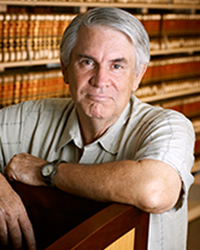Thomas B. McAffee

What is the most significant issue facing your field and how should it be addressed?
I think it will be the constitutional crisis that eventually will come under the Trump presidency. The President appears to be involved in a “slow burn” Saturday Night Massacre; that could easily create a crisis by itself if it continues. Beyond the immediate context, the President appears to have engaged in at least obstruction of justice. It is not clear how much else will be easily proved, but the actions of the administration suggest that he is at least in stonewalling mode. We just need to stay the course and defend the Russian probe, insisting that the President do the same.
What is it about being a law school professor that inspires or motivates you?
I find that almost everything sooner or later turns on one’s theory of human nature and ultimate values. I recently read a not-new interview with Barack Obama, and he was asked: “who is your favorite political philosopher”? His response: Reinhold Niebuhr, who combined a realism about human nature with a sound philosophy of human justice. I read Niebuhr as an undergraduate philosophy major, and his writings have influenced my own views of constitutional decision-making. When I recently led a Facebook post with a Niebuhr quotation, an old friend wrote: don’t you miss the days when we had a President who had read Niebuhr?
What have you read, listened to, or watched recently that has influenced you or your work?
I was deeply touched by Gene Robinson’s book, God Believes in Love: Straight Talk About Gay Marriage. The book is directly about the topic of the book I am trying to complete. Robinson was the first openly gay person elected to be an Episcopal Bishop. As one with a granddaughter who “came out” to her parents a couple of years ago, it meant a great deal to read a thoughtful Christian’s defense of sexual minorities and explanation of why “celibacy” is not the answer to the reality of a different sexual orientation